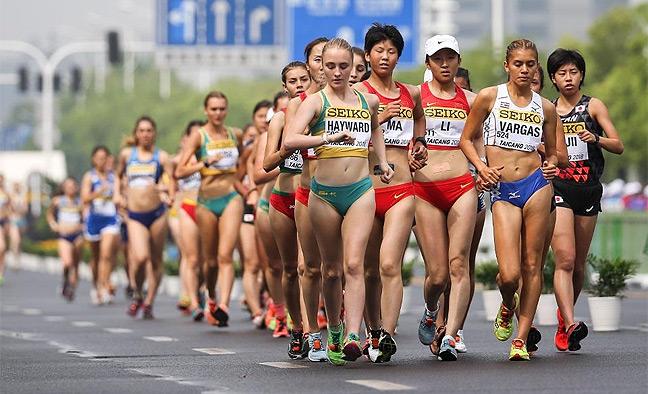The World Athletics Championships continue to capture global attention as athletes from around the world compete for glory on the track. Amid the high-stakes competition, the event’s officials have issued a reminder regarding the rules governing slogans and messages displayed by competitors. This comes in the wake of sprinter Jeremiah Azu’s recent encounter with the guidelines, underscoring the importance of adhering to the regulations set forth by World Athletics. The reminder highlights the balance between athlete expression and maintaining the integrity of the championships, a topic gaining renewed focus as the tournament progresses.
Jeremiah Azu Faces Slogan Guidelines Ahead of World Athletics Championships
Jeremiah Azu, the rising sprint star set to compete at the upcoming World Athletics Championships, has been briefed on the crucial guidelines governing slogans displayed during the event. Athletes are reminded that all slogans on clothing and accessories must comply with strict regulations to maintain the competition’s professional standards and avoid any form of political, commercial, or offensive messaging.
The World Athletics governing body outlined the following key points for slogan compliance:
- Slogans must not exceed 30 characters, including spaces
- Only neutral or athlete-related messages are permitted
- Brands or commercial advertising are strictly forbidden
- Any slogan deemed controversial or offensive will be instantly removed
| Aspect | Guideline |
|---|---|
| Max Characters | 30 (including spaces) |
| Content | Neutral or athlete-related only |
| Commercial Ads | Not allowed |
| Offensive Language | Prohibited |
Understanding the Rules on Athlete Messaging and Expressions
At the heart of international track events lies a complex set of guidelines regulating what athletes may display during competitions. The World Athletics organization has established strict rules on messaging and clothing slogans, aimed at maintaining the focus on sport and ensuring no unauthorized political, commercial, or social statements overshadow athletic performance. Jeremiah Azu’s recent reminder serves as a timely clarification: slogans visible on apparel or accessories must adhere to size limits and content restrictions, avoiding any form of offensive or controversial messaging. Officials emphasize that slogans under 20 characters and free from disruptive content generally meet approval, but anything beyond these limits risks disqualification or removal.
For quick reference, these core points summarize the key directives governing athlete expressions at championships:
- Message length: Maximum 20 characters
- Content restrictions: No political, commercial, or offensive language
- Visibility rules: Slogans must not cover branding or sponsors
- Enforcement: Monitoring before and during events, with warnings and penalties for breaches
| Rule Aspect | Details |
|---|---|
| Message Length | ≤ 20 Characters |
| Allowed Content | Positive, Non-Political |
| Prohibited Content | Political, Commercial, Offensive |
| Penalties | Warnings, Disqualification |
Impact of Slogan Regulations on Competitor Freedom and Sporting Spirit
Strict regulations on slogans during the World Athletics Championships have sparked debate concerning the balance between maintaining competitive fairness and allowing personal expression. While rules aim to keep the competition focused solely on athletic performance, some argue that they inadvertently restrict athletes’ freedom to express individuality and messaging that can inspire fans and fellow competitors alike. The enforcement of uniform slogan guidelines ensures a level playing field by preventing political, commercial, or controversial statements from overshadowing the sport, but it also raises questions about where the line should be drawn in supporting an athlete’s voice without compromising the event’s impartiality.
Key considerations of the slogan regulations include:
- Ensuring slogans do not promote political or commercial interests
- Preserving the integrity and neutrality of the championships
- Preventing potential distractions for competitors and audiences
- Balancing athlete expression with sport unity and respect
| Aspect | Impact |
|---|---|
| Competitor Freedom | Limited, with boundaries on messaging |
| Sporting Spirit | Protected, promoting focus on athleticism |
| Public Engagement | Potentially reduced personal connection |
Expert Recommendations for Navigating Promotional Restrictions at Major Events
At high-profile sporting events such as the World Athletics Championships, athletes and their teams must remain vigilant about promotional content, especially slogans on apparel. Experts emphasize that all slogans must adhere strictly to event-specific guidelines, which often prohibit brand advertisements or politically charged messages. Compliance not only prevents disqualification but also maintains the integrity and neutrality of the competitions. It’s crucial for athletes to coordinate with event organizers well in advance to understand acceptable slogan content and secure necessary approvals.
To help navigate these complex regulations, the following best practices are recommended by industry professionals:
- Review guidelines early: Obtain and study the official promotional rules issued by event organizers.
- Seek pre-approval: Submit slogans and designs for authorization before the event to avoid last-minute issues.
- Keep messaging neutral: Avoid overt political statements or commercial promotions that could breach restrictions.
- Consult legal advisors: When in doubt, get expert legal opinions to ensure compliance with advertising laws and event mandates.
| Common Restriction | Recommended Action |
|---|---|
| No visible brand logos | Use generic or non-branded apparel |
| Prohibited political messages | Choose neutral slogans emphasizing sportsmanship |
| Size limits on text | Verify slogan dimensions comply with event specifications |
| Color restrictions | Select colors that do not confuse with official event branding |
To Conclude
As the World Athletics Championships continue to captivate audiences worldwide, the incident surrounding Jeremiah Azu’s slogan serves as a timely reminder of the sport’s regulations and the importance of maintaining decorum on the global stage. While athletes channel their passion and individuality, adherence to agreed guidelines remains paramount to ensure fair competition and respect for all participants. The BBC will keep viewers informed on any further developments as the championships progress.





